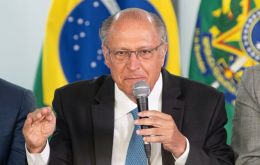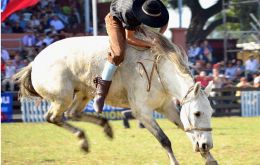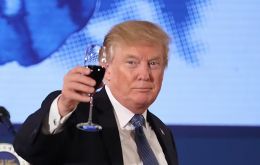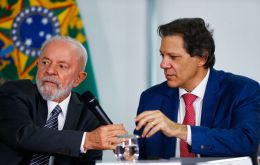MercoPress. South Atlantic News Agency
Economy
-
Friday, March 14th 2025 - 19:42 UTC
FAO: Coffee production down brings prices up to all-time high

The United Nations Food and Agriculture Organization (FAO) released a report on Friday stating that global coffee prices hit a 13-year high in December last year, driven by reduced production in major exporting countries due to adverse weather.
-
Friday, March 14th 2025 - 10:55 UTC
Brazil lifts import taxes of foodstuffs to lower inflation

Brazil's Chamber of Foreign Trade's (Camex) Executive Management Committee (Gecex) gave its nod Thursday to the temporary removal of import taxes on nine food items to lower prices for local consumers. The tax exemption applies to boneless frozen beef, roasted and unroasted coffee beans, corn (not for sowing), certain uncooked pasta, cookies, extra virgin olive oil, crude sunflower oil, cane sugar, and preserved sardines (limited to 7,500 tons). Taxes ranging between 7.2% and 32% have been lowered to 0% in a move to curb inflation. The measure is effective starting Friday. Authorities insisted it would only be for a limited time.
-
Thursday, March 13th 2025 - 19:25 UTC
Uruguayan President backtracks on horsetaming restrictions

Uruguayan President Yamandú Orsi suspended for 180 days a regulation passed last month by the previous administration of Luis Lacalle Pou concerning the National Institute of Animal Welfare (INBA) to prioritize animal welfare in horsetaming (jineteadas). The newly-inaugurated head of State said the measure approved last Feb. 10 was too strict to rural sectors, forcing them to cancel several traditional events.
-
Thursday, March 13th 2025 - 18:17 UTC
Ireland donates to Brazil's Amazon Fund

Ireland has joined as the eighth donor to Brazil's Amazon Fund, contributing € 15 million, it was reported Thursday. The fund, managed by Brazil's National Bank for Economic and Social Development (BNDES), supports conservation, monitoring, and sustainable development in the Amazon and has financed 123 projects since 2009. In 2024 alone, R$ 200 million (US$ 34.4 million at the current exchange rate) was allocated, aiding efforts to reduce deforestation, which dropped over 45% compared to 2022. Environment Minister Marina Silva emphasized that Ireland's support recognizes Brazil's achievements in combating deforestation and climate change, while the fund continues to attract international partners committed to sustainability.
-
Thursday, March 13th 2025 - 17:57 UTC
Trump threatens to impose 200% tariffs on all EU alcoholic products

US President Donald Trump threatened Thursday to impose a 200% tariff on all European Union (EU) alcoholic products, including wines, champagnes, and other beverages, in response to the reinstatement of a 50% tariff on American whiskey. The EU's tariffs, announced by the European Commission on Wednesday, are set to begin on April 1 and fully take effect by April 13, targeting US$ 19.6 billion in US imports. This move retaliates against Trump's recent 25% tariffs on steel and aluminum imports starting Thursday. The EU tariffs also revive previous measures from 2018 and 2020, impacting US$ 8.7 billion in US goods, focusing on products from Republican-led states like soybeans, beef, and poultry.
-
Thursday, March 13th 2025 - 10:40 UTC
Trump's 25% tariffs: Lula's gov't favors negotiation over retaliation

The Brazilian government criticized US President Donald Trump's decision to impose a 25% tariff on steel and aluminum imports. The protectionist move is foreseen to cause the South American country around US$ 1.5 billion loss in exports, primarily affecting semi-finished products. Despite its potential impact on the steel sector, minimal effects on Brazil's GDP and total exports are projected. The Government of President Luiz Inácio Lula da Silva favors negotiation over retaliation.
-
Thursday, March 13th 2025 - 08:53 UTC
Major US airlines cutting back services amid consumer retreat

Delta Air Lines and United Airlines have announced plans to reduce capacity due to overbuilt summer schedules and other challenges. Delta President Glen Hauenstein stated at a JP Morgan investor conference that the airline will scale back its summer capacity, with specifics to be revealed in its March 22 schedule. United Airlines CEO Scott Kirby said that the airline will retire 21 aircraft early, cut capacity in markets with high government traffic, particularly Canadian destinations, and reduce redeye flights. He also noted that these cuts would primarily occur in unprofitable regions where United is not the leading carrier.
-
Tuesday, March 11th 2025 - 10:05 UTC
Opposition lawmakers file criminal case against Milei over IMF loan decree

A group of opposition lawmakers filed a criminal complaint against Argentine President Javier Milei for signing an Emergency Decree (DNU) to enable a new ten-year agreement with the International Monetary Fund (IMF) aimed at canceling non-transferable Treasury bills held by the Central Bank (BCRA). The decree bypassed the traditional legislative process of sending a bill to Congress, which Economy Minister Luis Toto Caputo said was necessary given the urgent need for IMF support.
-
Tuesday, March 11th 2025 - 09:51 UTC
Brazil’s trade suffering the impacts of lower prices for commodity exports and rise in imports

Brazil’s trade balance during February experienced a monthly deficit of US$ 323.7 million, the first since January 2022, (US$ 59,1 million). This compares with a trade surplus of US$ 5.13 billion in the same month a year ago. However despite the negative result, Brazil maintained a trade surplus of US$1.9 billion for the first two months of the year, according to Valor Economico, the leading financial media of South America’s leading economy.
-
Monday, March 10th 2025 - 10:58 UTC
CFK lambasts Milei for deal with IMF

Former Argentine President Cristina Fernández de Kirchner (CFK) was heavily critical of the incumbent Javier Milei's intentions to borrow from the International Monetary Fund (IMF) to keep inflation at bay. She argued that Milei's reliance on the Austrian School of economics has led the Libertarian administration to the current situation and that the solutions intended were harmful to Argentina's interests.
